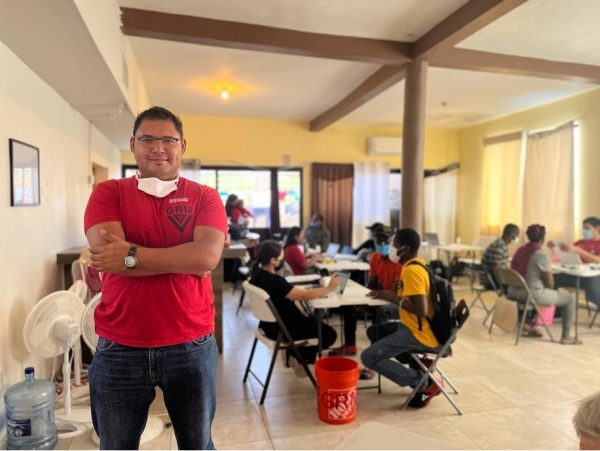by our clinic coordinator in Reynosa, Mexico, Jorge Flores

I’d like to use this blog to tell you a little about what happens in this small part of the world and the conditions in which migrants live in Reynosa. My work involves helping my boss, Brendon Tucker, with the administration of the clinic, stocking medicine and supporting the local staff, to ensure that we have everything needed to work and in the best possible conditions.
It is not easy. The high demand for medical services coupled with little support from the Mexican federal, state and municipal government makes it hard to offer good medical care to all migrants who are waiting to progress their asylum case on the border.
The provision of GRM’s services is reliant on collaboration with other NGOs, volunteer doctors and nurses and the support, financial or otherwise, from everyone who believes in, and donates to, our project. These factors allow us to offer medical support and to provide long term medicines and antibiotics for children and adults.
I also want to explain what day to day life is like in Reynosa. As the weather turns, the cold and rain make it harder to work. Poor roads and bad drainage means that the rains regularly convert the area into what is essentially a muddy swimming pool, which restricts our access to shelters and other areas where the migrants congregate.
Obviously access is important for medical support, but it’s more than that. It’s about the inhumane ways in which these people have to live during the rainy season, where many of them are sleeping on muddy streets in small tents cooking food on tiny structures that have been built to contain fires. The residents trudge through mud to go about their business. Mothers and children sit out the rain in their tents waiting for their husbands, fathers or brothers to return ‘home’ with something to eat or drink that might have been donated by a nearby shelter.
Exposure to these elements causes a huge toll on their health.
This is just a small example of what is happening in the community, imposed on people who have been forced to leave their homes to protect themselves from the danger in which they were living, from political wars and crime. They had to choose between living in constant fear or trying to travel somewhere just as dangerous, but at the end of the day, one that includes a small hope of a better life.
—
Jorge Flores is a licensed psychologist with a masters in Administration, he currently works for GRM in Reynosa, Mexico, as coordinator of the clinic.
Spanish Version
Hola mi nombre es Jorge Flores, soy Licenciado en Psicología y Máster en Administración, actualmente trabajo en GRM Reynosa como coordinador de clínica y a continuación quiero platicarles un poco de lo que pasa en esta pequeña parte del mundo.
Mi trabajo radica en ayudar a mi jefe Brendon Tucker con la administración de la clínica a revisar la compra de medicamentos y apoyo al equipo local de médicos, principalmente que tengamos todo para poder realizar nuestro trabajo en las mejores condiciones posibles.
Esto no siempre es fácil debido a la alta demanda de atención médica y los pocos apoyos del gobierno municipal, estatal y federal complica poder brindar un buena atención a todos los migrantes que se encuentra parados en la frontera esperando solución a su proceso migratorio, con esto y la colaboración con otras ONG, Doctores y enfermeras que trabajan como voluntarios y principalmente todas aquellas personas que creen en nuestro proyecto y realizan donaciones a nuestra fundación han sido un factor fundamental para poder suplir la demanda de atención médica y medicamentos crónicos y antibióticos para niños y adultos.
Pero en otro tema quiero platicarles de nuestro día a día en Reynosa, con la entrada del cambio climatológico en la zona nuestro trabajo se ha complicado más, la mala infraestructura vial y el mal drenaje pluvial convirtieron a Reynosa en una gran piscina de lodo fangoso.
Esto limitando nuestro paso a los albergues y a las zonas donde la comunidad migrante se encuentra asentada, y el tema del acceso a la atención médica tema que importante para todos, no puedo omitir la forma inhumana en la que viven los migrantes ahora por la entrada del invierno con lluvia, muchos de ellos duermen en las calles fangosas dentro de pequeñas casa de campaña. En esos mismos espacios cocinan sus alimentos en pequeñas estructuras que levantan el fuego del agua, caminan entre el lodo para hacer sus necesidades fisiológicas, caminan entre el lodo a buscar comida que donan dentro de los albergues, madres y niños dentro de las carpas aguantando la lluvia y el frío esperando a sus esposos, padres o hermanos que regresen del exterior con algo para comer o beber.
Y si hablamos médicamente esas condiciones que están viviendo ahora dentro de unos días nos dejaran problemas de salud por la exposición a todas estas condiciones.
Este es un simple ejemplo de lo que pasa la comunidad migrante en su travesía, en su esfuerzo por salir de sus casas para salvar sus vidas del peligro por las guerras políticas y de la delincuencia, ellos tienen que elegir seguir viviendo con miedo o emprender un viaje que es igual de peligroso pero que a final del día les brinda una esperanza de una vida mejor.
BLOG POSTS ARE THE OPINION OF THE AUTHOR AND DO NOT NECESSARILY REPRESENT THE VIEW OF GRM